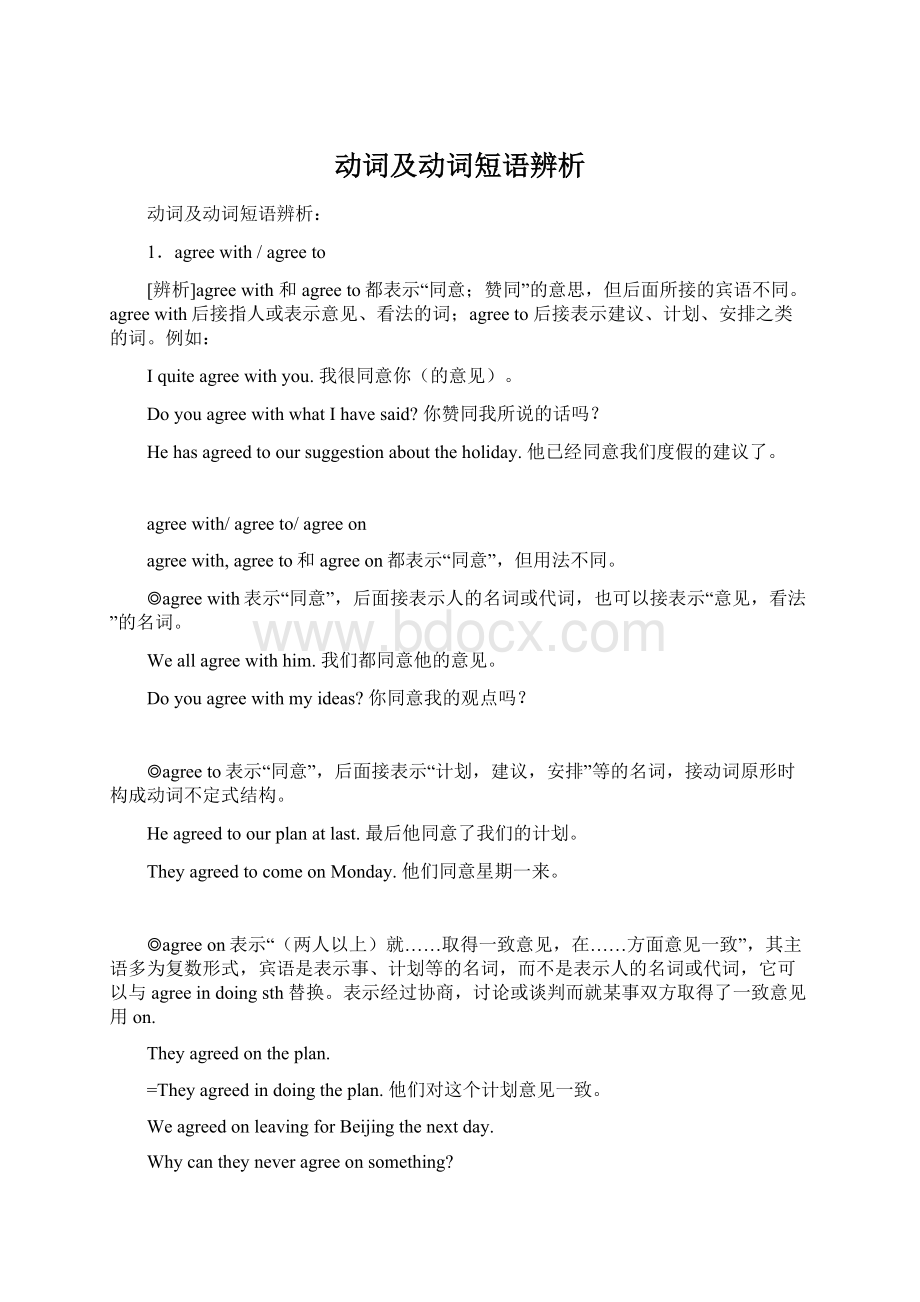动词及动词短语辨析.docx
《动词及动词短语辨析.docx》由会员分享,可在线阅读,更多相关《动词及动词短语辨析.docx(16页珍藏版)》请在冰豆网上搜索。

动词及动词短语辨析
动词及动词短语辨析:
1.agreewith/agreeto
[辨析]agreewith和agreeto都表示“同意;赞同”的意思,但后面所接的宾语不同。
agreewith后接指人或表示意见、看法的词;agreeto后接表示建议、计划、安排之类的词。
例如:
Iquiteagreewithyou.我很同意你(的意见)。
DoyouagreewithwhatIhavesaid?
你赞同我所说的话吗?
Hehasagreedtooursuggestionabouttheholiday.他已经同意我们度假的建议了。
agreewith/agreeto/agreeon
agreewith,agreeto和agreeon都表示“同意”,但用法不同。
◎agreewith表示“同意”,后面接表示人的名词或代词,也可以接表示“意见,看法”的名词。
Weallagreewithhim.我们都同意他的意见。
Doyouagreewithmyideas?
你同意我的观点吗?
◎agreeto表示“同意”,后面接表示“计划,建议,安排”等的名词,接动词原形时构成动词不定式结构。
Heagreedtoourplanatlast.最后他同意了我们的计划。
TheyagreedtocomeonMonday.他们同意星期一来。
◎agreeon表示“(两人以上)就……取得一致意见,在……方面意见一致”,其主语多为复数形式,宾语是表示事、计划等的名词,而不是表示人的名词或代词,它可以与agreeindoingsth替换。
表示经过协商,讨论或谈判而就某事双方取得了一致意见用on.
Theyagreedontheplan.
=Theyagreedindoingtheplan.他们对这个计划意见一致。
WeagreedonleavingforBeijingthenextday.
Whycantheyneveragreeonsomething?
◎ agreeaboutsth涉及讨论的题目
Theyneveragreeaboutpolitics.
Theyallagreeaboutthat.
特别提示
agreewith也可以表示“某人适应(食物、气候等)”。
Theweatherdoesn’tagreewithme.我不适应这种天气。
(2)disagree是agree的反义词,相当于notagree。
2.beableto/can
beableto与can都有“会”“能够”的意思。
如:
Noonecandoit.=Nooneisabletodoit.
当表示现在或过去“能力所及”时,两者可通用。
Hecan/isabletospeakGerman.
Icould/wasabletorunawayfastwhenIwasaboy.
但两者用法也有区别:
1.beableto侧重强调能力,语气上要比can强一些。
可用于多种时态,还可以和某些情态动词连用,其后接不定式。
Nooneisabletodoit.
Hewasabletoswimwhenhewasquiteyoung.
Noonewasabletoanswerthequestion.
I’msorryIhaven’tbeenabletoansweryourletter.
I’venotbeenabletofindtheairticket.
Ihaven’tbeenabletogetintouchwithher.
Theywillbeabletofinishtheworktomorrow.
IshallbeabletospeakEnglishwell.
Youmightbeabletocatchupwiththem.
II.can也可表示能力,这时它和beableto同义,但它只有现在和过去两种时态形式,不能和其它情态动词连用。
Look!
Icanswimnow.
Myfathercouldspeakfivelanguages.
III.can还可以表示“请求和允许“,而beableto则不能。
CanIcarryyourbag?
Canyouhelpme?
IV.beableto的过去时还可以表示一种“经过努力做到了”的意思。
Can的过去式则没有这种意义。
Hestartedlate,buthewasabletocatchtheeighto’clocktrain.
Ex:
用can或beableto填空:
1.Noone______dothework.
2.I______not______gotoworkforthreedays.
3.Mylittlebrother______swimwellwhenhewasonlysix.
4.I______finishthebooknextweek.
5.Hetriedhardand______swimacrosstheriver.
6.He______not______comesincehegothurt.
(1.can/isableto 2.have,beenableto 3.could/wasableto 4.shallbeableto 5.wasableto 6.has,beenableto)
3.begin/start
begin表示“开始”,其内涵是“使处于进程中”。
例如:
Knowledgebeginswithpractice.从实践开始。
start 表示“开始”,其内涵是“起程”。
例如:
Themeetingbeganlastweek.次会议是上星期开始的。
会议是个过程,在这个意义上用begin恰当。
再如:
Athousand-lijourneyisstaredbytakingthefirststep.千里之行,始于足下。
所包含的意义是“起步”,所以用start恰当。
4.borrow/lend/keep
[辨析]这两个动词都有“借”的意思。
1)borrow指向别人借东西(借入),常与from连用。
即borrowsthfromsb.(somewhere)向某人或某处借某物例如:
MayIborrowyourpen?
我可以借用一下你的钢笔吗?
IborrowedadictionaryfromLiLeiyesterday.我昨天向李磊借了一本字典。
Doyouoftenborrowbooksfromthelibrary?
你经常从图书馆借书吗?
2)lend指把东西借给别人(借出)。
一般后面带双宾语。
表示“把某物借给某人”,用lendsbsth=或lendsthtosb例如:
Ioftenlendhermoney.我经常借给她钱。
Youmustn’tlendittoothers.你一定不要把它借给别人。
Thankyouverymuchforlendingthedictionarytome.非常感谢你把词典借给了我。
Ihavelostmypen.Wouldyoupleaselendmeyours?
我把钢笔弄丢了,你能把你的借给我吗?
注意:
当sth为代词时,只能说lendsthtosb.不能说lendsbsth例如:
Pleaselendittome.(T)
Pleaselendmeit.(F)
3)keep指某物能“借”或“保留”多少时间,是持续性动词,而borrow,lend都是短暂性动词。
HowlongcanIkeepthebook?
这本书我能借多久?
I’lllendyoumydictionary,butyoucanonlykeepitforoneday.我将把我的字典借给你,但是你只能借一天。
[练习]用borrow,lend和keep填空:
1.Wouldyouplease______yourpenciltome?
2.I______fiveyuanfromhimyesterday.
3.Youmay______thisbookforthreedays.
4.I’mgoingto______youmybike.
5.CanI______yourruler?
6.I______somebooksfromthelibraryyesterday.
7.HowlongmayI______thebook?
8.He______mehiscarforanhourlastnight.
9.MayI______yourbike?
10.Who______youthisbook?
(key:
1.lend 2.borrowed 3.keep 4.lend 5.borrow )
6.borrowed 7.keep 8.lent 9.borrow 10.lent)
5.choose/select/pick
choose,select,pick这组动词都有“挑选”的意思。
choose强调在“选择”某物时的意愿,特别是当挑选物只有两个时,我们应当用choose。
如:
Youcanchooseanyofthetwobooks.你可以选择这两本书中的任何一本。
当供选择物多时,最好用select,因为有较多的被挑选物,被选人就必须加以鉴别。
如:
Theywereselectedfrommanyapplicants.他们是从许多请求者当中选出来。
pick在用作“挑选”时,不强调鉴别,也不强调意愿。
如:
Tompickedaredshirtbecausehelikedred.汤姆挑选了一件红衬衫,因为他喜欢红色。
6.cross/pass
cross作动词,意为“横过;越过;穿过”,注意across是介词,不可以与cross昏庸,如:
Theycrossedtheroad。
他们过了马路。
pass作动词,是指从某地、某物或某人的旁边“经过”,也表示从某物内部或人与热、无物与物之间“穿过”,还可以表示时间或空间的“经过“。
如:
Hepassedthepostofficejustnow. 他刚才经过邮局。
7.cost/pay/spend/take
这四个词都可以表示“花费“,但用法有别。
cost的主语必须是“物“或”事“后常接life,money,health,time等词。
如:
Thatsuitcostsme$.那件上衣花掉我6美